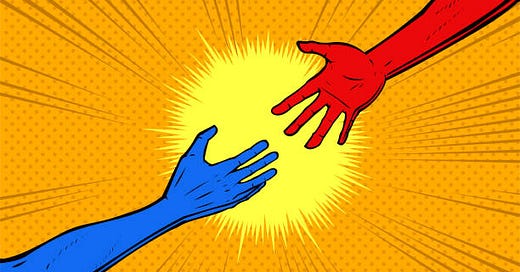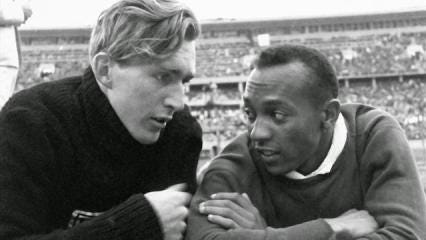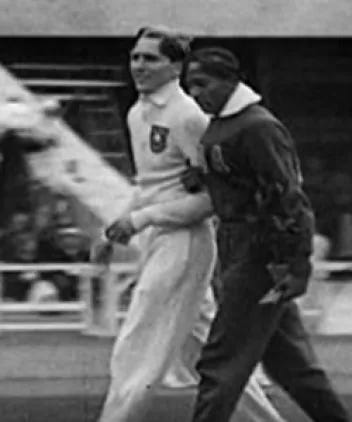We all know the story of Jesse Owens, the African American athlete who won four gold medals, shattering Hitler's myth of Aryan supremacy.
But there's another story, equally powerful yet less told, that challenges our assumptions about human nature and the power of individual choice in the face of systemic hatred.
Carl Ludwig “Luz” Long was born April 27, 1913, in Leipzig, Germany. He practiced law in Hamburg, Germany, after graduating from the University of Leipzig. In 1936 he held the European long jump record.
Luz was the Aryan “master race” stud Hitler dreamed of. His man in finance, trust fund, six-five, blue eyes.
But here's where it gets interesting.
It’s the 1936 Berlin Olympics. Jesse Owens, struggling. Two fouls in long jump qualifications. One attempt left. Tension thick in the stadium air.
Luz Long approaches Owens. With of all things, advice. A competitor helping a rival. Owens qualifies.
In the finals: Owens, 8.06 meters. Gold.
Long, 7.87 meters. Silver.
Luz was the first to congratulate Owens. They walk arm-in-arm through the stadium, under the Führer's gaze. A friendship blooms, defying the hatred around them.
Psychologists have long studied the concept of in-group favoritism - our tendency to prefer those who are similar to us. In 1936 Berlin, with Nazi propaganda at its zenith, this favoritism should have been at its most potent. Long, by all accounts, should have seen Jesse Owens as the enemy.
Jesse and Luz became friends at the Olympics and corresponded for years after that. Jesse would say of his Olympic friendship with Luz:
“It took a lot of courage for him to befriend me in front of Hitler… You can melt down all the medals and cups I have and they wouldn’t be a plating for the twenty-four karat friendship that I felt for Luz Long at that moment.”
Luz’s last letter to Jesse in 1942 or 1943, probably written from North Africa where Luz was in the German Wehrmacht, spoke to the friendship they had:
I am here, Jesse, where it seems there is only the dry sand and the wet blood. I do not fear so much for myself, my friend Jesse, I fear for my woman who is home, and my young son Karl, who has never really known his father,” Long wrote.
My heart tells me, if I be honest with you, that this is the last letter I shall ever write. If it is so, I ask you something. It is a something so very important to me. It is you go to Germany when this war done, someday find my Karl, and tell him about his father. Tell him, Jesse, what times were like when we not separated by war. I am saying—tell him how things can be between men on this earth.
If you do this something for me, this thing that I need the most to know will be done, I do something for you, now. I tell you something I know you want to hear. And it is true.
That hour in Berlin when I first spoke to you, when you had your knee upon the ground, I knew that you were in prayer.
Then I not know how I know. Now I do. I know it is never by chance that we come together. I come to you that hour in 1936 for purpose more than der Berliner Olympiade.
And you, I believe, will read this letter, while it should not be possible to reach you ever, for purpose more even than our friendship.
I believe this shall come about because I think now that God will make it come about. This is what I have to tell you, Jesse.
I think I might believe in God.
And I pray to him that, even while it should not be possible for this to reach you ever, these words I write will still be read by you.
Your brother,
Luz
Carl “Luz” Long was wounded in Sicily on July 10,1943, during the Allied invasion of Sicily in Operation Husky (July 9 – August 17, 1943). He died on July 14 in a British military hospital there. Luz was buried in Motta St. Anastasia German War Cemetery in Sicily.
He was 30 years old.
What Long's story teaches us is profound. In a world that often seems determined to highlight our differences, it reminds us of our shared humanity. It shows us that even in the darkest times, individual choice can light the way forward.
History is messy. People, complicated. The most powerful stories often come from unexpected places. Long's tale isn't about Olympic glory. It's about the courage to extend a hand when the world expects a fist





